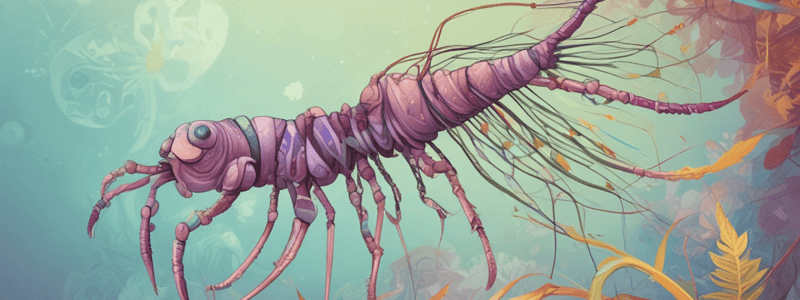Podcast
Questions and Answers
Which branch of biology focuses on the study of microorganisms?
Which branch of biology focuses on the study of microorganisms?
- Botany
- Ecology
- Zoology
- Microbiology (correct)
What is the basic unit of life according to the Cell Theory?
What is the basic unit of life according to the Cell Theory?
- Cell (correct)
- Organism
- Organ
- Tissue
What is the sequence of nitrogenous bases that determines the amino acid sequence of proteins?
What is the sequence of nitrogenous bases that determines the amino acid sequence of proteins?
- DNA Structure
- Genetic Code (correct)
- Cellular Processes
- Mendel's Laws
What is the process by which species change over time?
What is the process by which species change over time?
What is the study of the relationships between organisms and their environment?
What is the study of the relationships between organisms and their environment?
What is the process by which cells divide to produce daughter cells?
What is the process by which cells divide to produce daughter cells?
Flashcards are hidden until you start studying
Study Notes
Branches of Biology
- Botany: Study of plants, including their structure, growth, evolution, and classification.
- Zoology: Study of animals, including their structure, growth, evolution, and classification.
- Microbiology: Study of microorganisms, such as bacteria, viruses, and fungi.
- Ecology: Study of the relationships between organisms and their environment.
Cells
- Cell Theory: All living organisms are composed of cells, cells are the basic unit of life, and all cells arise from pre-existing cells.
- Cell Structure: Cell membrane, cytoplasm, nucleus, mitochondria, ribosomes, lysosomes, and golgi apparatus.
- Cellular Processes: Metabolism, photosynthesis, respiration, and cell division (mitosis and meiosis).
Genetics
- Mendel's Laws: Laws of inheritance, including the law of segregation, law of independent assortment, and law of dominance.
- DNA Structure: Double helix model, with sugar and phosphate molecules making up the backbone, and nitrogenous bases (A, C, G, and T) forming the rungs.
- Genetic Code: Sequence of nitrogenous bases that determines the amino acid sequence of proteins.
Evolution
- Theory of Evolution: Species change over time through the process of natural selection, genetic drift, mutation, and gene flow.
- Mechanisms of Evolution: Natural selection, genetic drift, mutation, and gene flow.
- Evidence for Evolution: Fossil record, comparative anatomy, and molecular biology.
Ecosystems
- Ecosystem Components: Producers (plants), consumers (herbivores, carnivores, omnivores), and decomposers (bacteria, fungi).
- Energy Flow: Energy from the sun is transferred from producers to consumers through food chains and food webs.
- Ecosystem Services: Provisioning services (food, water, etc.), regulating services (climate regulation, etc.), and cultural services (recreation, etc.).
Studying That Suits You
Use AI to generate personalized quizzes and flashcards to suit your learning preferences.




